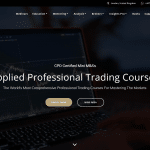Forex brokers earn revenue by facilitating access to the currency markets for retail and institutional traders. Their business models include various revenue streams, including spreads, commissions, swaps, and value-added services. Understanding how forex brokers make money helps traders assess broker transparency, pricing fairness, and potential conflicts of interest.
Main revenue sources for forex brokers
1. Spread markups
The spread is the difference between the bid and ask price of a currency pair.
- Brokers widen this spread to include a markup, especially on standard accounts
- For example, a raw interbank spread might be 0.1 pips, but the broker quotes 1.0 pip
- The difference (0.9 pips) becomes broker profit on each trade
Fixed vs. variable spreads:
- Fixed spreads: Brokers quote consistent markups, often used by market makers
- Variable spreads: Float with market conditions, common in ECN or STP models
2. Trading commissions
ECN and raw spread accounts charge a commission per trade, typically:
- $3–$7 per side per standard lot (100,000 units)
- Brokers offering 0.0 pip spreads rely on commissions for revenue
- Ideal for scalping and high-volume traders who need raw pricing
3. Swap and rollover fees
When a position is held overnight, the broker applies a swap rate (interest differential):
- Positive swaps: Trader receives a credit if long the higher-yielding currency
- Negative swaps: Trader pays a fee if holding the lower-yielding currency
- Brokers may mark up swap rates or charge administrative fees on Islamic accounts
4. Inactivity and admin fees
Some brokers charge:
- Inactivity fees on dormant accounts
- Withdrawal processing fees
- Conversion fees on non-USD accounts
- VPS hosting or premium platform access fees
These create non-trading revenue that supports operational costs.
5. Internal dealing desk profits (market makers)
Market maker brokers may take the opposite side of client trades:
- If the client loses, the broker profits
- To manage risk, brokers hedge positions or use B-booking (internalised trading)
- Reputable brokers use hybrid models to avoid excessive conflict of interest
6. Rebates and partner programs
Brokers often earn through referral traffic via:
- Introducing broker (IB) commissions
- CPA/affiliate payouts
- These may come from trader volumes, spreads, or deposits
- Rebates reduce the broker’s net income per trade but help expand the client base
7. Asset diversification
Many brokers now offer:
- Indices, stocks, commodities, crypto CFDs
- Brokers earn additional spreads and swaps across multi-asset classes
- This diversifies income and increases trade volume per client
Transparent vs. opaque revenue models
| Revenue Type | Transparent Brokers Use? | Common in Brokers Like |
|---|---|---|
| Spread markup | ✅ | Standard/STP brokers |
| Commission fees | ✅ | ECN brokers |
| Market-making profits | ❌ (when undisclosed) | Dealing desk brokers |
| Swap fees | ✅ (with clear tables) | All broker types |
| Admin fees | ✅ (if disclosed) | Offshore or hybrid brokers |
How brokers reduce risk while making money
- Hedging client flow with liquidity providers
- Using A-book/B-book split to manage exposure
- Offering micro/cent accounts for volume-based growth
- Applying risk management systems to offset volatile activity
Key takeaways
- Forex brokers make money via spreads, commissions, swaps, and admin fees
- Market makers earn directly from client losses but often hedge risk
- ECN/STP brokers rely on volume and tight pricing to generate commissions
- Look for brokers with transparent pricing, swap tables, and regulation
- Always read the fee schedule and execution policy before opening an account
Frequently Asked Questions
Do brokers make money when I lose a trade?
Market makers might, if they take the opposite side. ECN/STP brokers earn regardless of your win/loss outcome.
Why do some brokers offer no commission?
They widen the spread instead, earning from the price difference on each trade.
Are swap charges profit for brokers?
Partially. Brokers apply a markup on interbank swap rates, generating overnight profit.
Is it better to use a broker with commission or spread?
For frequent traders, raw spread + low commission is usually cheaper than wider commission-free spreads.
How can I tell if my broker is making money fairly?
Check if the broker is regulated, discloses all fees, and uses A-book execution or hybrid models transparently.




Leave a Reply
Please log in or register to share your thoughts.